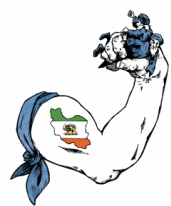Topic: Islamic Jihad
Wow talk about Synchronicity.
When I read in
LGF
The Women of Iraq Need Us
The women of Iraq need our help now more than ever, as the Iraq Constitution is being drafted. It’s no secret that the state of women’s rights in the Arab/Muslim world is abysmal, but there is an historic opportunity now to begin setting things right by making sure the Iraq Constitution does not incorporate the repressive 12th century code of shari’a. The Middle Ground is fighting to get these issues noticed.
I almost wished I had named my earlier post yesterday
"The Women of Iran Need Us" instead of Submission
THEN the post I was planning to write about
Ayaan Hirsi Ali Could have been named
"The Women of Holland and Somalia, Need Us"

Quite some time ago before 9/11
I was aware
that someone could write
"The Women of Afghanistan Need Us"
I got that Idea from the
Revolutionary Association of the Women of Afghanistan (RAWA)

Meena (1956-1987)
RAWA's martyred founder
If you are freedom-loving and anti-fundamentalist, you are with RAWA. Support and help us
I am also aware and have been for some time we could write.
"The Women in Malaysia Need Us"
From the Website of Sisters in Islam we read about their dismay
at the thought of Strict Shar'ai being imposed upon them instead of Secular Law.
Hudud in Terengganu - A Law to Protect Rapist
9 May 2002
The Hudud Bill drafted by the Terengganu state government
constitutes a gross violation of the principles of justice and equality in Islam.

For those of the opinion that Iraq, Afghanistan,Malaysia,Somalia, and Iran
are far away and none of our busines,
let me point out these issues now
hit VERY close to home.
"The Women of CANADA Need Us"
Islamic group against Ontario use of sharia law
Canadian Press
A Canadian Islamic group is trying to prevent the word shariah from being included in Ontario's Arbitration Act on the grounds it creates a "slippery slope" that blurs dangerously the lines between family and criminal law.
Currently, the law provides for voluntary faith-based arbitration, which allows Muslims, Jews and members of other faiths to use the guiding principles of their religion in settling private disputes such as divorce, custody issues and inheritances outside the court system.
But the Council on American-Islamic Relations Canada is worried that including the word shariah in the legislation would enshrine in law so-called shariah tribunals, which they say are a violation of the Charter of Rights and Freedoms.
Critics of sharia tribunals say they permit Islamic jurisprudence to swell beyond the scope of family law, potentially exposing vulnerable groups, particularly women, to unjust treatment in the eyes of the Charter.
"They say women will be coerced and pressured and will be oppressed," said CAIR-CAN director Riad Saloojee.
"The differential treatment under Islamic law in certain circumstances will basically affect equality rights."
In addition to the Qur'an, shariah is based on the Hadith, a complementary collection of sayings, and the Sunnah, which are practices of Islam's founder, the Prophet Muhammad.
The scope of a traditional shariah tribunal is extensive and includes a canon of criminal law which, for the most part, is incompatible with the Charter, Saloojee said. The debate has polarized Canada's Muslim community, he added.
"There is enough by way of controversy in the Muslim house to make it interesting."
While CAIR-CAN supports faith-based arbitration as an alternative to litigation, Saloojee and others say safeguards are necessary to ensure that vulnerable groups, especially women, are not "coerced" into using the practice.
Ontario's Arbitration Act is mainly used for commercial arbitrations, where the parties are typically represented by lawyers who can protect their rights.
Those who want to take advantage of faith-based arbitration are typically less sophisticated and don't enjoy the same protection, Saloojee said.
"Many people feel very comfortable resolving their issues on faith-based principles," he said.
"If you were to give many (Muslims) a choice of resolving them in the legal system or resolving them quietly, quickly and according to faith-based principles they already believe in, and tend to expedite the process, they will do that."
Moderate Muslim cleric Ahmad Kutty, one of two Canadian imams who made headlines a year ago when they were kicked out of the U.S. on suspicions of terrorism, said he supports leaving shariah out of the act.
"Shariah is a loaded word; it includes all of the civil, criminal and other institutions associated with the Islamic legal system," Kutty said. "No one in his right mind would propose implementing this system of laws in Canada."
But Kutty said he still supports the concept of faith-based arbitration, so long as "sufficient safeguards and checks and balances" are in place to protect the rights of "those who are often vulnerable to exploitation."
Saloojee said the use of faith-based arbitration is on the rise for Canada's burgeoning Muslim community.
Islam is Canada's fastest growing religion, with 579,640 Muslims enumerated in the 2001 census, more than twice the number in 1991.
Some 61 per cent, or 352,500, live in Ontario.
As a result, the province has asked former attorney general Marion Boyd to conduct a review of the province's arbitration processes.
She is expected to deliver her recommendations in September, but said she has yet to decide whether to recommend using the word shariah to describe faith-based arbitration for Muslims.
"I haven't made up my mind yet," Boyd said. "I can tell you that CAIR-CAN is not the only group that has suggested that it is inappropriate to call this shariah."
Other groups, like the Institute of Islamic Law in Canada, have expressed support for the term shariah, Boyd said. The institute could not be reached for comment.
Cross Reference - Islamic Law in Canada
(Note the following will be active links on the website above)
Headline Index:
?
Politicians in Quebec Urge Against Shari?ah Law (Canada)
?
Shari?ah Law Proposal Supported by B?nai B?rith, Sparking Ire of Islamic and Jewish Feminists (Canada)
?
Ontario Muslims Should Be Allowed to Use Shari'ah Law for Civil Disputes, Report Says (Canada)
?
CAIR-Canada Says Use of "Sharia" Law Creates "Slippery Slope," Muslims Divided Over Issue (Canada)
?
Concerns Continue Over Oppression of Women in Islamic Law Courts (Canada)
?
Islamic Law Courts Test Boundaries of Tolerance in Canadian Society (Canada)
?
Ontario Government to Review Plans for Use of Shari'a Law (Canada)
?
Women Speak Out Against Approval of Shari'a Law Tribunals (Canada)
?
Group Fights Islamic Law in Canada, Citing Infringment of Women's Rights (Canada)
?
Law Provision Allows for Use of Islamic Law Courts to Settle Civil Disputes (Canada)
?
Opinion: Islamic Tribunals Would Decrease Burden on Judicial System and Save Tax Dollars (Canada)
?
Canadian Muslims Able to Use Shari'a Law in Civil Disputes (Canada)
?
Editorial: All Canadians Should Abide By Same Laws (Canada)
?
Muslim Leaders Elect Council to Establish Shari'a Judicial Court (Canada)
First They Came for the Jews
First they came for the Jews
and I did not speak out
because I was not a Jew.
Then they came for the Communists
and I did not speak out
because I was not a Communist.
Then they came for the trade unionists
and I did not speak out
because I was not a trade unionist.
Then they came for me
and there was no one left
to speak out for me.
Pastor Martin Niemoller
TODAY
they come for Muslim Women
are you going to
SPEAK OUT
Or just wait for them to come for
| Post Comment | Permalink | Share This Post
Updated: Sunday, 3 June 2007 6:24 AM CDT

















